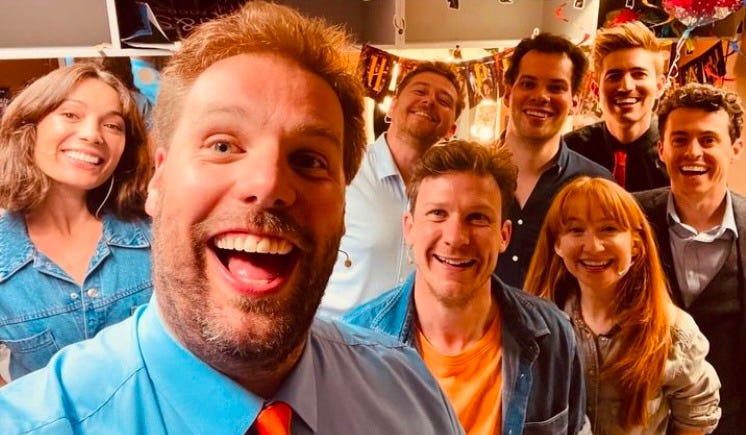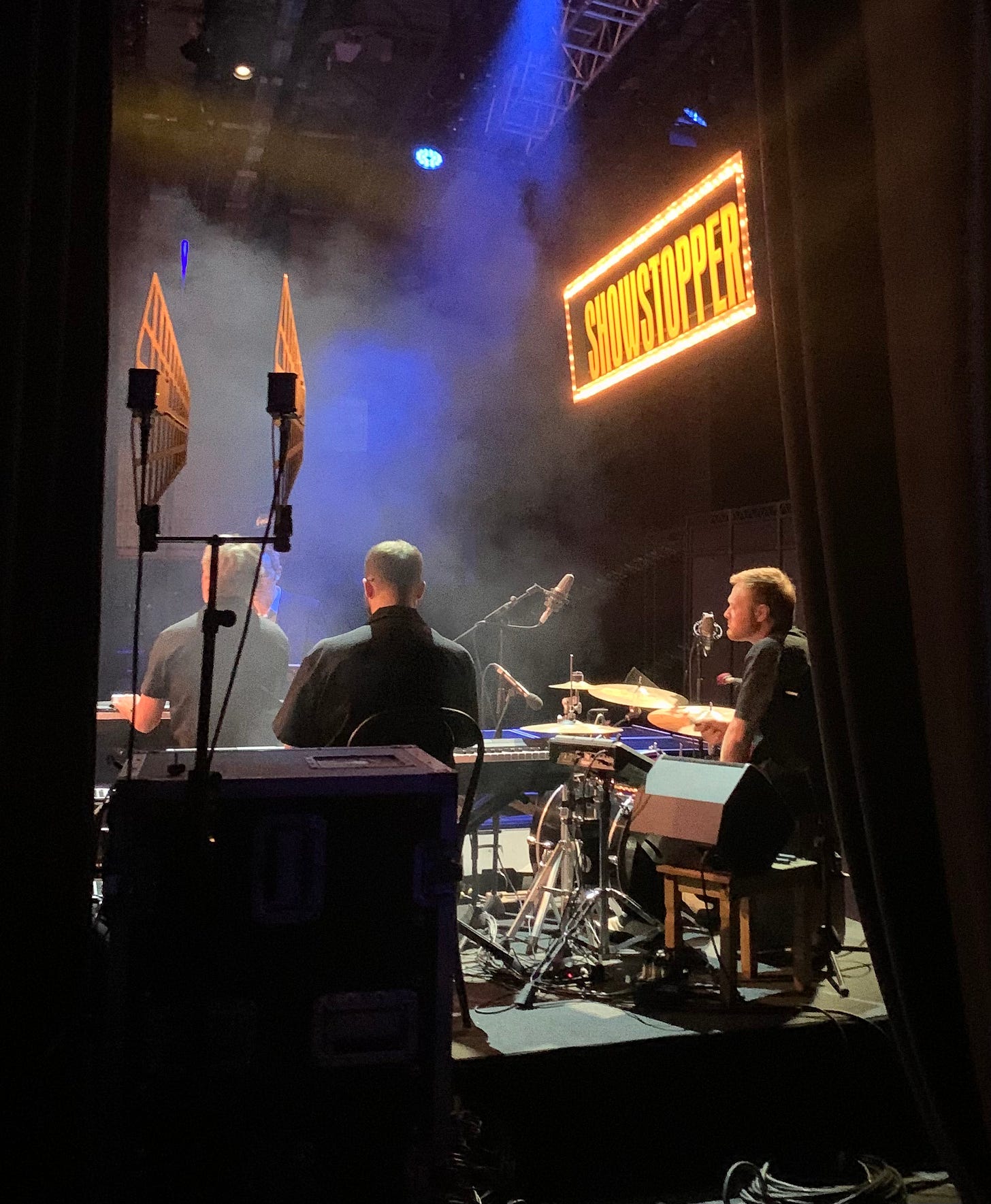Happy new-year-back-to-school everyone! Ok it’s not technically the new year, but for many people working in comedy, September feels like a new beginning. The Edinburgh Fringe is over and everyone is polishing their trophies or picking up the pieces (delete as applicable). Comedians are putting shiny new protractors into their brand new pencil cases onto which they are Tipp-Exing quotes from their latest show. Later on they’ll meet up behind the bike sheds and swap gossip about who was snogging who in Brooks bar. (No one was. Tragically, we’re all too old for snogging now.)
I didn’t take a solo show to the fringe this year and the FOMO was real, but I’m hoping that this means when I do take my show to Edinburgh it’ll be in a solid place. Fingers crossed. Instead, I took part in the London run of Mischief Movie Night and popped up to the Edinburgh Fringe with Showstopper! The Improvised Musical for a week. What this meant was that I did 24 improvised narrative shows over the month and two nights of Paul Merton and Suki Webster’s improv show, so 26 shows in total. It’s been years since I’ve done that many improvised shows in a row, and there were definitely moments when I wondered what it does to a person’s brain to be improvising full-on, high pressured comedy shows almost every day.

I found Edinburgh a bit tough on my emotional well-being, as is sometimes the case. It felt strange to come up for the final week, when the fringe was in full swing. For many it was a “final push” but for me it was very much an initial push, especially since, after the fringe ended, I’d be returning to another week in Movie Night. It was all a bit discombobulating. It made me think about how important it is for performers to look after our mental health, particularly with regards to improv, which is such a personal type of performance. Unlike conventional actors, we improvisers conjure everything up from our own weird/happy/sad subconscious. It’s similar with stand up and clown too of course, in which the performers also bring their own psyches to the stage. When you throw in the relationship between performer and audience and, in the case of improv, the interpersonal relationships between cast-mates, it’s even more important to be in a good place, emotionally speaking. Like anyone, there were occasional days throughout August when I wasn’t feeling my best, and when that was the case it was challenging to bring joy to the stage, and to stay relaxed and open. It’s hard to “follow the fun” if you’re not having fun…
Anyway, here are a few things that I found helpful to think about. I hope they will be of use to you too, or maybe you will have other techniques to add.
Millican’s Law
This is a well established comedy rule which was invented by comedian Sarah Millican. The idea is that, regardless of whether you had an amazing show or a horrific show, you’re only allowed to dwell on it until 11am the next day. This is such a healthy idea! If you go into your next show (whether it’s stand up, character comedy, clown or improv) attached to the joy or pain of the last one there’s the danger it will throw you off. I often forget to use this rule (many’s the time I’ll still be berating myself at 11:06am) so I’m writing it here as a gift to you and a reminder to myself.
HALT(S)
This comes from comedian Felicity Ward (via Georgie Carrol - on the ComCom podcast) who uses the acronym HALTS. It’s based on a version without the S, used by Alcoholics Anonymous, in which the letters stands for Hungry Angry Lonely Tired. In the AA version it’s used as a tool to notice and address your needs early on. In other words, if you’re feeling “Lonely” the advice is to try to find a way to connect with people, if you’re feeling “Angry” it’s good to find a healthy way to feel/express that anger etc.
In a performance context you can use it to check in with yourself as to whether you are feeling any of these things throughout the day before the show and, if you are, to try to address those needs. Felicity Ward adds an “S” for “Serious” which I like. Obviously you can bring your serious self to the stage (this in itself could be funny) but in this context I think she means not to take yourself too seriously, and to make sure you’re allowing yourself to be playful. This is not to be confused with toxic positivity, or forcing yourself to seem “fun” - you definitely don’t need to pretend to be upbeat when you go on stage - that would be awful. Rather, it’s about checking in on yourself and making sure you’re in a playful place. I found the HALTS acronym helpful. There was definitely one night during Mischief Movie Night in which I forgot to check my H for “Hunger” beforehand, and became increasingly confused as the plot went on. My blood sugar dipped, along with my concept of reality…although to be honest that’s just a typical Mischief Movie Night storyline. Regardless, the moral of the story is: carry a banana with you at all times.
Practise delight in others.
This is more relevant to improv than stand up, but when I was having a tough time inside my brain, my friend (the exceptional improviser Lauren Shearing) reminded me of one of my favourite quotes : “If we treat each other as if we are geniuses, poets and artists, we have a better chance of becoming that on stage.” (Del Close). I consciously thought about this before a show one night, and it helped massively. If you go into a scene loving everyone’s offers and ideas, it puts you in a joyful state of mind. You want to follow the fun and stop judging what is happening around you. It keeps you in the moment. I highly recommend this for improvisers. When you love what others are doing on stage, the next step, to try to make other people look brilliant by building on their ideas, feels very natural indeed.

I hope you had a good summer, whether you were at the Edinburgh Fringe, doing shows in London, or not doing shows and just being a normal, fully functioning human being. As it’s the comedian’s new year, my new year’s resolution is to be a bit more consistent and to post these Substacks fortnightly. Do spread the word if you enjoy them. I will also be doing some more work in progress shows of my solo show soon and I’d love you to be there. Stay tuned.
News
Murder for Dummies
Casual Violence are a sketch group who have made their own 6 episode horror-comedy whodunnit. It’s so good! It’s very funny and gorgeously shot. I pop up in it extremely briefly, surrounded by a cast of excellent people. Do subscribe to their YouTube channel and look out for the release date on October 10th.
Richer Than God: The Tony Milch Story
The Awkward Silence are also a sketch group who have made their own 6 part mockumentary. It’s witty and silly and funny and stars the Awkward Silence playing the men and Ruth Bratt and I playing ALL the women. It’s out already, so you can watch it now!
I have huge respect for people who make their own work (It takes ages! It requires so much will power! The admin is never ending! AND it takes talent!) so any watches/likes/shares/general spreading the word for either of these great projects would be really appreciated by them and me.





I always enjoy reading your pieces Susan. You write well on performance and solo work. Mental health is a big issue. So here's my question. How do you wind down after a performance? I'll assume you drink, take drugs and party. That's a given. But otherwise? Ben